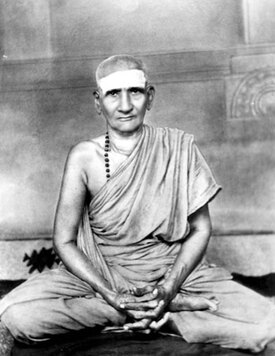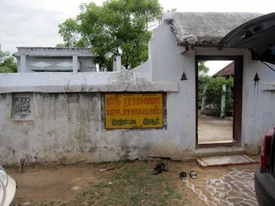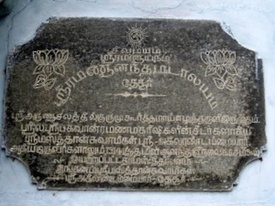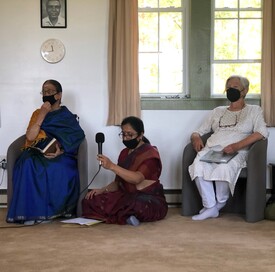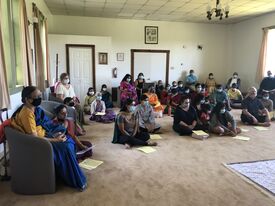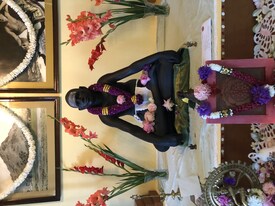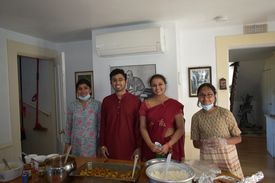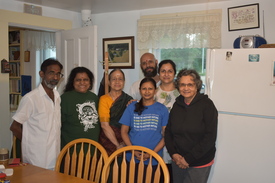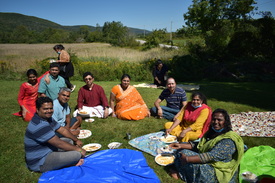Akhilandamma
A Life of Service and Surrender
Akhilandamma initially saw Sri Bhagavan shortly after his arrival at the Arunachaleswara Temple in 1896. She returned to him in 1903 and remained devoted to him for the rest of her life. Sri Bhagavan gave her the highest advaitic upadesa in three brief words – unnai vidāmal iru, “Be without leaving yourself.” Akhilandamma, who faced no shortage of difficulties in her day-to-day life, also asked Sri Bhagavan for his protection during these trying times. Sri Bhagavan graciously granted her freedom from any fear, encouraging her to hold on to him in her heart. This she did until her last breath, serving Sri Bhagavan and his devotees with ever-flowing love and unending surrender.
Born in 1887, Akhilandamma was ‘married’ at the age of five.[1] Her husband died two years later. As per the then social custom, ‘remarriage’ not being possible, she decided to devote her life to serving sadhus. In 1903, she visited Sri Ramana on the hill and felt his power. She served food to him for the next four decades. She recalls:
In 1903, while wandering near the hill for gathering flowers, I saw many people walking towards the Sadguru Swami Cave. A person from the crowd told me, “There is one Brahmana Swami there who sits motionless.” These words kindled in me a desire to see him. I bought a little sugar candy as a token offering and went to see him. What a sight he was! For the first time I saw the magnetic Lord who draws towards himself the minds of those who see him. Even though he was unwashed and covered with dust, his body glowed like gold.
When I went for darshan again, Bhagavan was sitting inside the Virupaksha Cave. On seeing Bhagavan my mind flowed towards him with uninterrupted, boundless love, but along with this emotion there was a sort of inexpressible regard and fear. It is only natural for people to feel a sense of awe and reverence while they are near Bhagavan. It is also natural for the individual self to subside in his presence. There was a gracious power that prevailed in that holy place. It numbed the mind, the power of speech and the body so effectively that the visitors were automatically silenced. There were no rules about silence, but in that holy presence casual visitors who had come for darshan would automatically remain calm and quiet.
When Bhagavan first moved to the Skandasramam, no cooking was done there. Bhagavan and the devotees depended upon the food offerings brought every day. Kamakshi Ammal and myself often used to take food to the ashram. One day, five or six heads of various maths came unexpectedly to the ashram to have Bhagavan’s darshan. Since we had not known about this in advance, the food was falling short. When it was time to eat, a devotee approached Bhagavan and said, “They are all waiting, may we take food?” Bhagavan, who knew about the shortage, replied, “Let us wait a while.” Sometime later, a group of people unexpectedly came, bringing with them big vessels full of food. Bhagavan asked them to first serve the food to everyone who was present. Only then did he stand up to indicate that he was ready to eat.
Once I went to the Skandasramam with fruits and milk. But Bhagavan’s mother was unwilling to have the offering brought by a non-Brahmin. Bhagavan, who understood his mother’s mind, said to her, “All right, it is better that you go back to your house in Madurai.” He then ate some of the offering and gave some to his attendant who returned what remained to me as Bhagavan’s prasad.
One day when I went up the hill with all the required foodstuffs to serve a bhiksha, a Swami told me, since it was a full moon day, it was an auspicious time to receive upadesa from great souls. I approached Bhagavan, bowed, stood up and said, “Bhagavan, kindly tell me something.” Bhagavan stared at me and asked, “About what am I to tell you?” I was both puzzled and nonplussed. A mixture of fear and devotion along with an eagerness to hear Bhagavan’s gracious words welled up within me, rendering me incapable of speech. I just stood mutely. Bhagavan understood my predicament. No one can hide anything from him. He can understand the state of mind of anyone who approaches him, merely by looking at him. He looked at me graciously and said, “unnai vidāmal iru”, that is, “Be without leaving yourself.”
I could not comprehend the meaning of this high-level upadesa, but as soon as the words came from Bhagavan’s mouth I felt an immense satisfaction and wonderful effulgence in my mind. These gracious words welled up in my mind again and again like the rising of tides. The feeling they produced gave me an indescribable happiness. I stood there delighting myself in the feelings produced by this one phrase. Even today, the sound of that upadesa rings in my ears and bestows immense peace on me.
Though I didn’t understand what Bhagavan had told, I immediately experienced the state that the words were indicating without ever really understanding what they meant. I came to understand through this experience that in Bhagavan’s benign presence a single gracious utterance can produce the fruit and the fulfilment of all spiritual practices such as sravana [hearing], manana [thinking or reflection] and nididhyasana [contemplation or abidance].[2]
In Bhagavan’s last days, while I was staying at my village, I was frequently thinking and worrying about his health. I went to the Ashram but was prevented from entering the gate as thousands were waiting to have his darshan. By Bhagavan’s grace an inmate of the Ashram who knew me somehow came to the place and informed Bhagavan that I had arrived. I was given permission to have darshan.
I tried to suppress my emotion but the feeling that I would soon be losing my one and only God completely destroyed my self-restraint. I cried out to him: “Bhagavan! Bhagavan has decided to give up this body. What can I do?” After I left the room, Bhagavan sent me the following message via the devotee who had opened the door for me: “Why do you feel sorry for this mortal body?” It occurred to me that Bhagavan was consoling me by saying: Don’t feel worry about this body, I am always your saviour!
Desur Math
David Godman, who has written extensively about Sri Bhagavan and his devotees, gives further insights into the life of Akhilandamma in his wonderful narrative:[3]
“When she stayed in her native village with her mother, many of Bhagavan’s devotees used to come and stay at her house. With the object of serving such devotees, Akhilandamma and Masthan Swami (whom she introduced to Bhagavan) established a math or centre there in 1914. Called Sri Ramanananda Mathalayam, it was the first ‘Ramana Centre’ to be established outside Tiruvannamalai. Many of Bhagavan’s early devotees such as Kunju Swami, Ramaswami Pillai, Madhava Swami and Ramanatha Brahmachari were taken there to recuperate from various illnesses they had contracted in Tiruvannamalai.
Kunju Swami, one of her cured patients, made this comment in the introduction to her biography: ‘I know that for the last forty years this lady has been engaging herself in serving food to Bhagavan Sri Ramana Maharshi and Mahan Seshadri Swami. Even from the days when Bhagavan was living at Skandashram, whenever any devotees there fell ill, it was her custom to take them to the math in her village and look after them. She would only send them back after curing their illness.’
The inscription etched in the stone shown in the following photo, that is found at Akhilandamma's ashrama dedicated to Sri Bhagavan reads:
“Om! Śrī Śivamayam! Śrī Ramanāya Nama! Śrī Ramanānanda Matālayam, Desur.
This Dharma-Establishment has been set up on the 9th day of Vaikasi month, the year of Ananda, 1914, by Akhilandamma and Mastan Swami, disciples of Śrīlashri Ramana Maharshi, who graced the world as a Sadguru, in Arunachala... Hereby, Śrī Mastan Swamigal, Akhilandammaiyār, Desur.”[4]
Ganapati Muni
David Godman continues:
“The following story, from Nageswara Rao’s account, was published in the Arunachala Ramana magazine in 1982. It does not appear either in Sadhu Om’s account or in the ‘Power of the Presence’ chapter on Akhilandamma:
Whenever Ganapati Muni saw me coming, he would exclaim with delight, ‘Oh! Akhilandamma has come!’
Emboldened by this, his favourable disposition towards me, one day I asked Ganapati Muni in a plaintive tone, ‘I am utterly unlettered while you, I am told, are a Master of all the Vedas and the Upanishads. What is the way for me?’
The great scholar explained to me, with great respect and sweetness, ‘Akhilandamma, you are really blessed. You are feeding Bhagavan Ramana who is the very avatar of Kumara Swami. This is a sure sign of the Lord’s grace. Bear it in your mind and take heart. No austerities can give fruit by themselves. Remember this always: it is Iswara who is the dispenser of the fruit [of karma]. Sent by that Iswara himself, Sri Ramana has come down to earth. So what can please Iswara more than devoted service to Sri Ramana? When you recognise this secret, your fruit will increase all the more.’
I have already acquainted you with the fact that my family was very poor. We were always beset with economic difficulties. In addition to this, there arose, at one time, differences in the family. Unable to bear that affliction, I came before Bhagavan, cried, and broke down in tears.
Bhagavan, after remaining silent for some time, opened his mouth and kindly said, ‘Desuramma [“Mother from Desur”, her village], you are under the impression that difficulties have come to you alone. This life is a blend of pain and pleasure. One should have no elation when there is pleasure, and no dejection when there is pain. Take my example. I came here at the age of seventeen. I had no mother or father here. I have spent my time in caves and under trees in sun, in showers, and in the cold. I begged alms to pacify my hunger. It is only nowadays that all of you have come here to minister to my needs.’
Still shedding tears, I said to Bhagavan in a begging tone of voice, ‘You, Bhagavan, are an incarnation, so you can bear all that. But what about a woman like me? I have no one but you to help me. You alone have to have compassion on me.’
These plaintive words moved Bhagavan, and his eyes became moist. After remaining grave and serious for a while, slowly and steadily these supreme words emerged from his mouth: ‘Hereafter, remember me whenever you face calamities.’
With these mighty words of grace ringing in my heart, I came out of the cave, followed by Ganapati Muni.
‘Akhilandamma!’ he cried with great elation. ‘Your virtue has ripened. Bhagavan has bestowed a rare boon on you. Never before have I seen Bhagavan bestowing a boon like this. And this boon is for future lives also. This day is one of extreme rejoicing for me, for the mighty power of conferring boons, till now hidden in Bhagavan, has now broken out for your sake. The hidden powers of a great and genuine Guru do not easily come out to work in the external world; they do so only for the sake of worthy disciples. The credit of drawing them out, pure lady, goes to you now.’
It was really a boon to me as my subsequent experience proved. When difficulties surrounded me like threatening clouds, when life itself became a dungeon, I would utter ‘Lord Ramana, my Lord Ramana,’ and call on his protection and help. Then, in a trice, the difficulties would disappear. However severe the calamity, because of Bhagavan’s protection, my mind would not get agitated.’”
39. Thoughts of bondage and of freedom last only as long as one feels, ‘I am bound’. When one inquires of oneself, ‘Who am I, the bound one?’ the Self, eternal and ever-free, remains. The thought of bondage goes; and with it goes the thought of freedom too.
40. If asked, ‘Which of these three is final liberation: With form, without form, or with and without form?’ I say, “Liberation is the extinction of the ego which enquires ‘with form, without form, or with and without form’?”
— Forty Verses on Reality (Ulladu Narpadu)Advent Celebration at Arunachala Ashrama
Nova Scotia, Canada
Celebration of the 126th anniversary of the arrival of Sri Ramana Maharshi at Arunachala was held on September 4th, 2022 at Arunachala Ashrama in Nova Scotia, Canada.
Devotees, who began arriving earlier in the week from Arunachala Ashrama in New York as well as from Ottawa, Toronto and Halifax, were honored to have the company of Srimati Mangalam Kalyanam, the grand-niece of Sri Bhagavan, and her daughter Ranjani Ramanan, who graciously accepted the invitation to join the celebration, travelling from North Carolina.
Following the completion of Uma-Maheshwara puja conducted by Sri Krishnan Subramanian, a welcoming address was given by Darlene Delisi Karamanos, who reminded us of the special significance of this day. She read of Sri Bhagavan's arrival at Arunachala from Madurai and of his abidance in the one reality that is Arunachala Shiva.
Then, Srimati Mangalam gave the following address:
“om namo bhagavate śrī ramaṇāya. Namaskar. My pranams to all of you.
It has been a long-time wish of mine to visit this Nova Scotia Arunachala Ashrama. I have been living in America for 20 years, and I feel extremely blessed to be finally visiting this Ashrama and to be celebrating this holy Advent Day with all of you.
It was my grandfather, Niranjanananda Swami, Bhagavan's younger brother's dream to have Bhagavan's name and teachings spread far and wide. Its seems to me that this Nova Scotia Ashrama has fulfilled his dream.
It was 100 years ago, in 1922, that Bhagavan's mother, Alagammal attained samadhi and was buried at the foothills of Arunachala on the outskirts of the town of Tiruvannamalai. I imagine that when this Nova Scotia Ashrama was established, this location too would have been similarly remote and forested. Just as Sri Ramanasramam has grown from being just a thatched hut in 1922 to a large Ashrama today, I pray that this Ashrama, started by Sri Bhakta Bhagawataji and nurtured by all of you, should grow steadily to become a haven for seekers and devotees in North America.
May Sri Bhagavan's blessings be with each one of you. om namo bhagavate śrī ramaṇāya.”
Bhajans were shared by Srimati Mangalam and Ranjani, Krishnan Tirunellai, Vignesh Subramanian and other devotees. Thiru Sivasamy recited verses from Tiruvasagam.
Prasadam, prepared under the direction of Srimati Vidhya Krishnan, was shared under the warm sunshine on the lawn of the Ashrama.
All felt blessed by the divine glance and ever-present grace of Sri Ramana Maharshi.
—— more images ——
Yoga Vasiṣṭha
Vasiṣṭha continued:
O Rāma, the unreal jīva perceives the unreal world on account of the unreal influence of the unreality. In all this what can be considered as real and what as unreal? An imaginary object is imaginatively described by someone and one understands in one’s own imagination and imagines that he understands it. Just as liquidity is in liquids, motion in the wind, emptiness in space, even so is omnipresence in the Self.
From the time the Lord instructed me, I have been performing the worship of the infinite Self. By the grace of such worship, though I am constantly engaged in various activities, I am free of sorrow. I perform the worship of the Self, who is undivided though apparently divided, with the flowers of whatever comes to me naturally and whatever actions are natural to me.
To come into relationship (to possess and to be possessed) is common to all embodied beings, but the yogis are forever vigilant, and such vigilance is the worship of the self. Adopting this inner attitude and with a mind utterly devoid of any attachment, I roam in this dreadful forest of saṃsāra (world-appearance). If you do so, you will not suffer.
When great sorrow (like the loss of wealth and relations) befalls you, enquire into the nature of truth in the manner described. You will not be affected by joy or sorrow. You now know how all these things arise and how they cease and you also know the fate of the man who is deluded by them, who does not enquire into their real nature. They do not belong to you; you do not belong to them. Such is the unreal nature of the world. Do not grieve.
Dear Rāma, you are pure consciousness which is not affected by the illusory perception of the diversity of creation. If you see this, how will notions of the desirable and the undesirable arise in you? Realizing thus, O Rāma, remain established in the turīya (transcendental) state of consciousness.
Rāma said:
Lord, I am free from the dirt of duality. I have realized that all this is indeed Brahman. My intelligence has been purified, rid of doubts and desires and even questions. I do not desire heaven nor do I dread hell. I remain established in the Self. By your grace, O Lord, I have crossed the ocean of saṃsāra. I have realized the fullness of direct Self-knowledge.
Vasiṣṭha continued:
This is not considered action, O Rāma, which you perform merely with the organs of action, with an unattached mind. The delight derived from sensual experience is fleeting. A repetition of that experience does not afford a repetition of the same delight. Who but a fool will entertain desire for such a momentary joy? Moreover, an object gives you pleasure only when it is desired. So the pleasure belongs to the desire – hence, give up desire or craving.
When you do not engage yourself in sense-experiences and also when you experience whatever comes to you unsought, you are in a state of equanimity and purity, free from latent tendencies or memories. In such a state, like the sky, you will not be tainted even by a thousand distractions.
With the slightest movement of the mind (when the mind blinks) the saṃsāra arises and ceases. Make the mind unblinking (free from the movement of thought by the restraint of the prāṇa and also the latent tendencies (vāsanās). By the movement of prāṇa, the saṃsāra arises and ceases. By diligent practice make the prāṇa free from such movement. By the rise and cessation of foolishness (ignorance), self-binding action arises and ceases; restrain it by means of self-discipline and the instructions of the preceptor and the scriptures.
The world-illusion has arisen because of the movement of thought in the mind. When that ceases the illusion will cease too and the mind becomes no-mind. That is the supreme state. The bliss that is experienced in a state of no-mind, that bliss which is uncaused, is not found even in the highest heaven. In fact, that bliss is inexpressible and indescribable and should not even be called happiness! The mind of the knower of truth is no-mind, it is pure sattva. After living with such no-mind for a time there arises the state of turīyātīta (the state beyond the transcendental, or the turīya state.)
[1] From Face to Face with Sri Ramana, Hyderabad Kendra
[2]
sravana, manana, nididhyasana{
[3] From David Godman, https://davidgodman.org/akhilandamma-ganapati-muni-and-jealous-sadhus/
[4] The sign outside reads “Sri Ramana Matālayam. Established 1914, Desur”, from G.Kameshwar, https://gkamesh.wordpress.com/tag/akhilandamma/
[5] ibid.



